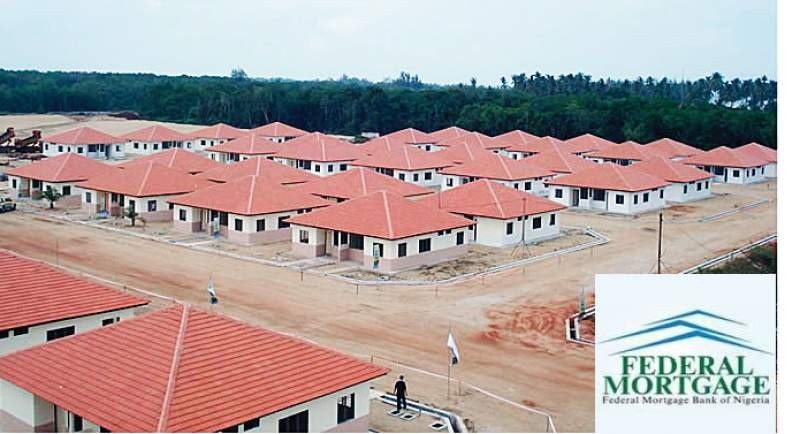 Federal Mortgage Bank Housing Development[/caption]
Federal Mortgage Bank Housing Development[/caption]
The National Housing Fund (NHF) scheme was established in 1992 by the administration of General Ibrahim Babaginda to address some constraints to the mobilisation of long term funds for housing finance.
It was also intended to ensure that every Nigerian has access to housing loans at affordable interest rates, through participation and contribution to the NHF.
According to the head of Corporate Affairs Department of Federal Mortgage Bank of Nigeria (FMBN), Mr. Lawal Isa K/Sauri, the overall objective of NHF is to provide cheap source of loanable funds to nurture and sustain the mortgage industry and eventually facilitate affordable home ownership for the low and medium income groups in the country.
Advertisement
Section 14(2) of the NHF Act Cap N .45 of 1992 stipulates that a contributor to the Fund can access a loan from the fund for the purpose of building, purchasing or renovation of existing homes /houses. To achieve, Mr. Isa said FMBN has developed concessionary loan windows to enable Nigerians access mortgages for home ownership.
“The realisation of this objective has been hampered by several challenges to housing finance in Nigeria, which include lack of access to land, inadequate funding for the housing sector, inaccessibility of mortgage loans due to lack of proper title to properties, low income of prospective borrowers which affects affordability, cumbersome procedures for obtaining governors’ consent to land transactions which is also costly,” Mr. Isa explained.
Explaining further, he said the challenges have limited the number of contributors to the NHF who have benefitted from the Scheme. As a result, he said, although there are currently about 4 million Nigerians that are registered and are contributing to NHF, FMBN has been able to provide mortgage loans to only about 60,000 contributors. This seemingly dismal number has created a negative image for the bank from the public who perceive it as not having effectively delivered on its mandate.
Best Dental Clinic In Dubai For Invisalign
Advertisement
To this end, FMBN has developed some quick wins that will allow a greater number of Nigerians access to the National Housing Fund. “The product shall be called the FMBN HOME RENOVATION LOAN (FHRL). This product will afford Nigerians an opportunity to access mortgage loans for the renovation or improvement of their existing homes. The product is specifically designed for Nigerians who are contributors to the National Housing Fund and desire to renovate or improve existing properties which are personally owned by them or through family ownership,” Isa told Abuja Metro.
The FMBN’s spokesman explained the modus operandi of the scheme and how Nigerians can better understand the technicalities involved. He said: “It is proposed that FMBN will approve and disburse the Home Renovation Loans through the Federal Government Staff Housing Loans Board (FGSHLB) for Federal Civil Servants and through the Office of the Head of Service or any other body recognised by the Bank at the State level, in the case of State civil servants.
“At the federal level, applications are to be aggregated by the FGSHLB while at the State level applications are to be aggregated by the relevant authority and forwarded to FMBN through the State Controller of the particular State. In the case of employees in the organised private sector (including other government agencies and parastatals not covered by the activities of FGSHLB) the applications shall be aggregated by the Permanent Secretary or Chief Executive of the organisation.
“The applications shall be received and assessed at the respective State Offices, to accord a level of ownership for effective management of the loans and broaden the Bank’s risk asset origination platform. For applications emanating from State Offices, the loans shall be approved and disbursed directly to the accounts of the beneficiaries after receipt of consent to disburse from the relevant authority (as above) through which the applications were submitted.”
Isa demystified the process and offered a simple approach on how Nigerians can understand the process. “The maximum loan amount shall be N1 million, subject to the income limit of the beneficiary as well as the ultimate cost of renovation. Applicants will apply through the Federal Government Staff Housing Loans Board (in the case of Federal Civil Servants) and through the Office of the Head of Civil Service of the State or other relevant authority recognised by FMBN.
“Approved loan amount shall be disbursed in lump sum to the Federal Government Staff Loans Board (FGSHLB) (in the case of Federal Civil Servants) and directly to the account of beneficiaries in the case of State Civil Servants and employees of the organized private sector, after acceptance of offer and the fulfilment of conditions precedent to draw-down. The loan tenor shall be a maximum of three or employee’s remaining years of service, whichever is less.”
Stakeholders in the housing sector believe that if the scheme is properly implemented, it has the potential to impact positively on the NHF scheme as well as the overall corporate image of the FMBN.
“The Home Renovation Loan Scheme will increase access to the benefits of the NHF scheme by more contributors improve the standard of living of beneficiaries, further enhance the FMBN’s social housing program, spur more Nigerians to contribute to the scheme, ameliorate the pressure on the regular NHF loan, increase staff productivity, especially State Offices that will be involved in processing the loans, as well as pursuing repayment/recovery of the loans and enable FMBN to reach out to a larger number of contributors with less resources,” Mr. Isa concluded.
Advertisement
Ends…


